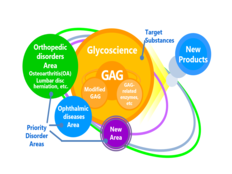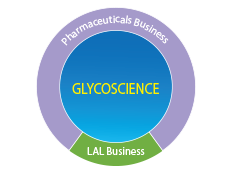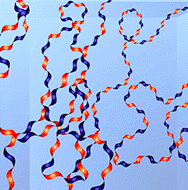One is often told, "Eat sweets when you're tired." However, consuming too much sugar isn't good for the body. Is there a scientific reason for this?
It is because the fastest acting source of energy for the brain is glucose (dextrose.)
Organs in the body generally use a monosaccharide called glucose (dextrose) as the most important source of energy, but in actuality they utilize fats and proteins as well. The brain, however, is an exception, and accepts nothing only glucose. In addition, although the brain constitutes merely 2% of the total body weight, it consumes 18% of total energy. For example, the amount of energy the brain of an adult male weighing 70 kg (154lbs) per day is equivalent to approximately 120g in glucose. The brain is an extremely picky eater and a glutton as well.
Then how does the brain secure this much glucose?
Most of the sugar that we normally ingest orally is starch and sucrose, and these are the main sources of glucose. Starch is a substance consisting of many glucose molecules linked in a chain, and is abundantly contained in rice and bread. But because it is slowly degraded by saliva and gastric fluid to be ultimately degraded into glucose in the small intestine and absorbed into the body, there is a disadvantage that it takes some time before it is absorbed. On the other hand, sucrose is a simple substance consisting of one glucose and one fructose bound together, and it is easily degraded. After sucrose is digested and absorbed in the small intestine, glucose can been seen in the blood within mere several tens of seconds. Sucrose is thus suitable for providing a quick supply of glucose to the brain.
Since the brain continues to consume glucose even while one is sleeping, blood glucose level is low immediately after waking up. It is known that brain activity is decreased when blood glucose level is low, and the reason your head is unclear before breakfast is because your blood glucose level is low.

▲ Human beings need to eat carbohydrates to obtain the energy required to stay alive. When carbohydrates enter the body, they are degraded into glucose (dextrose), which in turn becomes the source of energy (ATP cycle).
What will happen to a person's body if low blood glucose level continues for a long period of time?
The worst case scenario is that the person will fall into a coma and die. However, human beings have fought against starvation throughout history, and the body has multiple mechanisms to increase blood glucose level even when the food supply is low. Low blood glucose level should not be of concern in present day Japan. On the contrary, prevention of high blood glucose level is of the utmost concern in a regular diet. Possibly due to the fact that humankind thus far has not faced the need to decrease blood glucose level, the only means of decreasing blood glucose level is insulin. It is said that diabetes patients in Japan increased by 50 fold over the past 40 years. This is thought to be due to insufficient insulin to decrease blood glucose level, as well as the great change in the Japanese diet in the post-war period.
Many aspects of diabetes remain unknown. However, it is clear that diabetes causes various adverse effects related to abnormalities in glucose metabolism.
Glucose metabolism is the mechanism that maintains blood glucose at a constant level. In a healthy state, if the blood glucose level is high, glucose in the blood stream is absorbed by the liver and becomes glycogen, and if the blood glucose level is low, glucose produced from degradation of glycogen is released into the blood stream. When a person has diabetes, however, cells in the body will not be able to use the blood glucose well. As a result, even though there is more than enough glucose in the blood stream, cells in the body will become energy deficient, attempts to produce glucose are made which can ultimately lead to degradation of muscles and fats, and blood glucose level further increases. The reason progressive diabetes patients lose weight despite the fact that they eat more is believed to be due to this vicious cycle.
It is difficult to cure diabetes even with modern medicine. Diabetes is believed to be caused by a complex combination of genetic factors and various environmental factors such as overeating, lack of exercise, and stress. There is no doubt that the best prevention is to regularly eat a healthy diet.
♦Glycoforum
In "GlycoWord", which is a subcategory of "Glycoforum," key words of research in glycoscience are classified into genres, and a specialized researcher in that field has written a commentary. Sialidase and insulin signaling are introduced as key words associated with the onset of diabetes and insulin.
Sialidase and Insulin Signaling
♦The National Diabetes Information Clearinghouse (NDIC)
This website is an information dissemination service of the National Institute of Diabetes and Digestive and Kidney Diseases.























